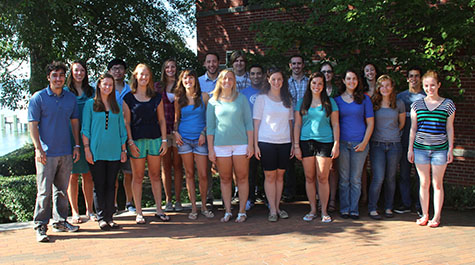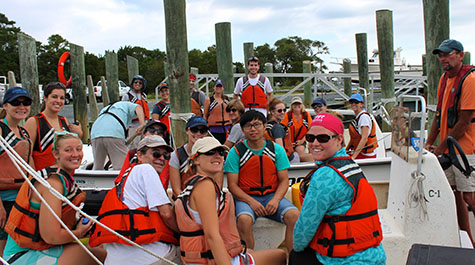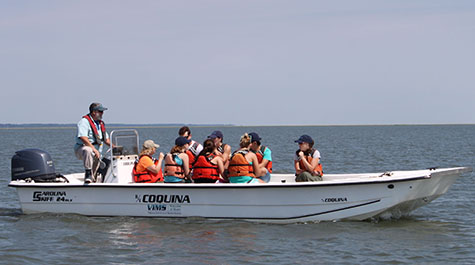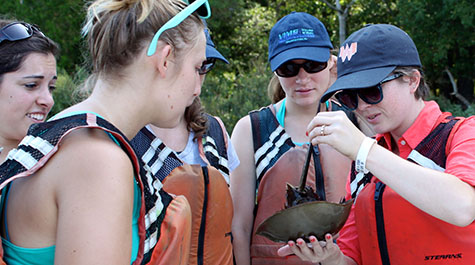School of Marine Science at VIMS welcomes new students
The Virginia Institute of Marine Science welcomed 19 new graduate students last week, infusing William & Mary’s School of Marine Science at VIMS with a new wealth of research experience and academic promise.
The students hit the ground running during a two-day orientation on VIMS’ Gloucester Point campus before starting class on Wednesday. Hailing from 11 states and 5 countries including Brazil, China, and Portugal, all of the students have conducted fieldwork aboard vessels or at research laboratories, in settings as diverse as Antarctica, Australia, Belize, and Alaska.
VIMS Dean and Director John Wells says the incoming class is particularly noteworthy for the wealth of experience they bring to their studies. “Every one of our new students has conducted significant marine research in the field or lab,” he says. “We’re looking forward to the blend of new ideas and enthusiasm that they bring, which helps maintain the high quality of research and academics at VIMS.”
The matriculating class brings total enrollment in the School of Marine Science at VIMS to 87 students. About half of the new students will work towards a Master’s degree, while the remainder seek a Ph.D. Among the 13 women and 6 men, there are 2 certified science teachers, a triathlete, and several students who’ve completed internships in programs sponsored by the National Science Foundation (NSF) or the National Oceanic and Atmospheric Administration (NOAA).
Professor Linda Schaffner, Associate Dean of Academic Studies at VIMS, says that selection of this year’s class was highly competitive. “They’re an extremely talented and well-rounded group,” she says. “I’m confident that the incoming students will contribute great things to VIMS, the local community, and our knowledge of Chesapeake Bay and the global ocean.”
Incoming student accomplishments
The new students arrived at VIMS with a number of accolades and research experiences already in hand:
- Taylor Armstrong, a graduate of the University of South Carolina, was a 2012-2013 Magellan Scholar at South Carolina’s Estuarine Ecology Lab.
- Pamela Braff received a bachelor’s degree from Boston University where she was the Clare Boothe Luce Scholar in 2010, and completed research at the Wee Wee Caye Marine Lab in Belize that same year. She received her Master’s degree from Virginia Tech.
- Elizabeth Carleton graduated from the University of New England where she did research for her bachelor’s thesis aboard commercial fishing vessels in the Gulf of Maine and at the Gulf Coast Research Lab in Ocean Springs, Mississippi.
- Molly Mitchell currently works as a marine scientist for VIMS’ Center for Coastal Resources Management. She received her bachelor’s degree from William & Mary and her Master’s from VIMS. She has co-authored numerous articles and reports with VIMS faculty, and has given several presentations to local audiences and professional organizations.
The remaining members of the incoming class are Jennifer Beckensteiner, Amanda Bromilow, Kenneth Czalpa, Marcos Krull, Vaskar Nepal KC, Bruce Pfirrmann, Qubin Qin, Bianca Santos, Miguel Semedo, Claudia Shuman, Julia Snouck-Hurgronje, Patricia Thibodeau, Kelley Uhlig, and Zoemma Warshafsky.
Warshafsky says she wanted to attend VIMS because of the unique, supportive, and collaborative atmosphere among its faculty and students. “The wonderfully friendly community is unlike any graduate program that I’m aware of,” she says.
Czalpa says he also chose VIMS based on its highly collaborative culture, and the research opportunities that arise as a result of those collaborations.
Thibodeau, a native of Maine, says making the move to VIMS has been her biggest personal accomplishment to date. “I grew up in a little, coastal town and attended a small liberal arts college,” she says. “This is the first time I’ve lived more than six months in a place other than Maine, so there are some growing pains associated with that, but I’m excited for the new opportunities that await me at VIMS.”
Thibodeau says she chose to make the move to Gloucester Point because of the opportunity to study zooplankton in Antarctica with her advisor, Professor Deborah Steinberg. “The VIMS community is so friendly, and it’s an environment that I knew I wanted to be a part of,” she says.
In addition to their orientation to life on VIMS' main campus in Gloucester Point, the students first week also included a weekend trip to VIMS’ Eastern Shore Laboratory in Wachapreague, where VIMS faculty introduced them to the area's unique coastal-bay and barrier-island ecosystems.
The School of Marine Science at VIMS
The School of Marine Science at VIMS is one of five graduate and professional schools of the College of William and Mary. It awarded its first Master’s degree in 1943 and inaugurated a Doctoral program in 1964. Nearly 1,000 marine scientists have now earned graduate degrees through the program. Graduate studies and research opportunities are offered in marine biology, oceanography, fisheries, aquatic health, and marine policy.
VIMS has an enviable record of producing graduates who take on leading roles in academia, government, and industry. VIMS grads head up the University of Maryland Center of Environmental Science, the Virginia Seafood Council, the Southeast Fisheries Science Center, one of the leading environmental consulting and engineering firms in the northeastern U.S., and the Smithsonian’s new Ocean Hall, among many other leadership positions.





